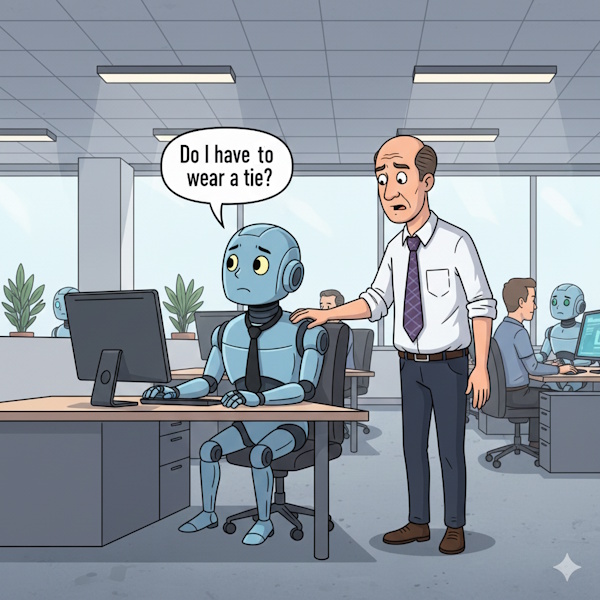 AI Jobs
AI Jobs
Like AI as a whole, the AI job market is booming. Here are some tips and techniques on how to be a part of it.
AI-related careers are rewarding, as they offer opportunities to work on cutting-edge technologies, solve impactful problems, and earn competitive salaries.
Investing in relevant skills and staying updated on AI advancements are keys to success. AI careers span companies and industries and are among the fastest-growing job markets in the world. The demand for AI professionals has increased as organizations adopt AI technologies for automation, decision-making, and innovation. AI-related jobs are growing rapidly as AI transforms industries like technology, healthcare, finance, and manufacturing. These jobs span technical, managerial, and creative roles, requiring skills in AI development, deployment, and maintenance. Continuous learning and staying updated on AI trends are essential for success in this fast growing field.

A Career in AI
Get on board for a job as an AI Engineer in the exciting AI industry 🚀
Are you looking for a career in AI? Transitioning to an AI career is doable with strategic learning and by leveraging existing strengths. Remember, it's a dynamic field that values diverse skill sets beyond programming alone. And you can get started by learning AI basics through online courses and tuturials.
In an AI World, you must upskill if your goal is to transition or advance your career. New technologies and process advancements are made across industries every year. Going forward, AI will change how everyone operates. Project managers will use AI software to automate repetitive tasks. IT will use AI tools like chatbots and virtual assistants to provide customers with support. User-interface designers will utilize AI to create new landscapes and increase on-page personalization.
Learn more: AI in America chapter on the AI Workforce.
 Skills in Demand
Skills in Demand
The need for skilled AI professionals spans nearly every industry. If you're looking to enter the professional world of AI, it's important to make sure you have the right skills.
For starters, you should have some knowledge and experience in computer programming languages, especially Python. Here are some desired skill sets:
- Programming languages: Python, Java, R, and C++.
- AI Frameworks: TensorFlow, PyTorch, and Scikit-learn.
- Data Handling: SQL, NoSQL, and big data technologies.
- Concepts: Machine learning, deep learning, neural networks, natural language processing, data analysis, computer vision, and cloud computing.
- Soft Skills: Problem-solving, critical thinking, and teamwork.
- Domain Knowledge: Industry-specific expertise, such as healthcare or finance.
 Popular AI Careers
Popular AI Careers
From developing algorithms to analyzing large datasets, AI professionals can choose from various roles that align with their skills and interests. Here are some AI career paths to explore:
AI Engineer: Design and develop intelligent systems that can perform tasks that typically require human intelligence, such as visual perception, speech recognition, decision-making, and language translation.
Software Engineer: Develop programs in which AI tools function. Build AI models from scratch and help customers understand results. Create algorithms for various AI applications. Desired skills include programming languages and software development experience.
Data Analyst: Design and maintain data pipelines and ensure data is accessible for analysis. Finding anomalies, patterns, etc. within large data sets to predict outcomes. Collect, analyze, and interpret data sets. Analyze complex data sets to identify business and market trends.
Machine Learning Engineer: Focuses on building and deploying machine learning models for real-world applications. Desired skills include TensorFlow, PyTorch, algorithms, and cloud computing.
AI Product Manager: Bridges the gap between technical teams and business goals to create AI-driven products. Desired skills include project management experience, understanding of AI capabilities, and communication.
Computer Vision Engineer: Develops systems for analyzing images and videos, commonly used in facial recognition and autonomous vehicles. Desired skills include image processing, neural networks, and software development.
Robotics Engineer: Designs AI-driven robots for applications in manufacturing, healthcare, and exploration. Desired skills include robotics frameworks, AI integration, and hardware-software interaction.
Data Scientist: Develops algorithms to analyze and interpret complex data, often used to train AI models. Desired skills include machine learning, Python, R, data visualization, and statistical analysis.
Research Scientist: Conducts cutting-edge research to advance AI technologies like deep learning and natural language processing. Desired skills include PhD-level expertise in mathematics and computer science. Proficiency in programming and statistical methods.
 Prompt Engineer
Prompt Engineer
A prompt engineer is a specialist who designs and refines the instructions - called prompts - that guide generative AI systems to produce accurate, useful, and reliable outputs. Prompt engineering is defined as the practice of writing clear, purposeful inputs that help AI models deliver context‑aware, high‑quality results across tasks like coding, data analysis, content generation, automation, and conversational design. Each word in a prompt influences how the model interprets intent, so prompt engineers craft inputs that shape the model's reasoning and reduce ambiguity.
Prompt engineering helps generative AI systems better understand and respond to a wide range of queries by iteratively refining prompts and techniques. Because generative models rely heavily on the quality of the instructions they receive, prompt engineers experiment with phrasing, structure, examples, and context to improve accuracy, reduce confusion, and minimize bias. Their work ensures that AI systems behave predictably and produce outputs aligned with user needs.
Prompt engineering involves structuring or crafting instructions to guide AI models toward more accurate and consistent responses. This can include specifying style, tone, grammar, context, or even describing a persona for the AI to adopt. In practice, prompt engineers act as translators between human intent and machine behavior, ensuring that AI systems understand what users want and how to deliver it effectively.
Anyone can perform basic prompt engineering, but professional prompt engineers go further by systematically optimizing prompts, testing variations, and building frameworks for reliable AI interaction.
As AI becomes more integrated into business, prompt engineers play a key role in creating applications and making systems reliable and efficient.

 Links
Links
AI Job Types
- onlinedegrees.sandiego.edu/artificial-intelligence-jobs/
- datacamp.com/blog/jobs-in-ai-to-pursue
- digitalocean.com/resources/articles/ai-careers
- techtrust.com/post/top-artificial-intelligence-job
Job Boards
User Stories
- ai4sme.aisingapore.org/2020/07/my-not-so-insane-career-leap-chasing-ai-dreams-from-my-hr-job/
- purpleslingshot.substack.com/p/my-journey-it-to-ml
- linkedin.com/posts/naikkrish_tavishi-transition-story-to-data-science-activity
AI Job Market
- investors.veritone.com/news-events/press-releases/detail/323/veritone-analyzes-u-s-bureau-of-labor-statistics-april-2024-jobs-report-and-ai-job-growth
- meritamerica.org/blog/job-market-trends-2025/
- newsroom.workday.com/2024-09-10-Workday-Global-Workforce-Report-Job-Market-Tightens-as-AI-Reshapes-Hiring-Processes
- institutedata.com/us/blog/data-science-and-ai-the-ultimate-career-transition-for-professionals-in-their-30s-and-40s/
- mckinsey.com/search?q=ai%20jobs
- brookings.edu/?s=ai+jobs